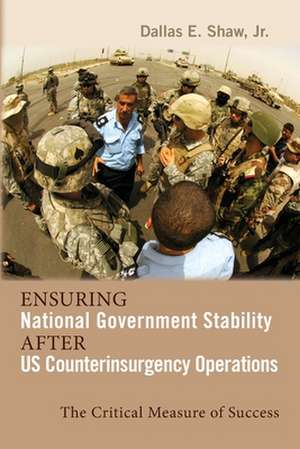Ensuring National Government Stability After US Counterinsurgency Operations: Rapid Communications in Conflict & Security Series
Autor Dallas E. Shawen Limba Engleză Paperback – 28 mar 2019
Much of the debate regarding US COIN operations since 1950 in Vietnam, Iraq, and Afghanistan has centered around discussions of population-centric COIN or enemy-centric COIN. But how do we explain how the US was successful at population-centric and enemy-centric COIN in Vietnam but failed to produce a state that was able to survive longer than 3.5 years on average after US combat formations departed. Or conversely, how do we explain how the US failed in population-centric and enemy-centric COIN in Nicaragua, but succeeded in producing a state that lasted over four decades?
In this first longitudinal and latitudinal study of all US foreign COIN interventions using combat formations, Dallas Shaw examines the variables involved in increasing state longevity after withdrawal (SLAW). This book proposes a theory of state-centric COIN such that state longevity increases after US withdrawal when the US employs institution inhabiting strategies to develop host-nation governance and security in the course of COIN interventions. This book uses small-N qualitative case-study methodologies to both develop and to test his theory of state-centric COIN. He relies on process tracing, contextually constrained historical comparison, and hoop tests to both infer a theory of state-centric counterinsurgency and test it alongside competing hypotheses.
This study examines four key detailed case studies and then combines this with qualitative methodologies to identify the variables most associated with increases in SLAW. Shaw compares two cases where the US intervened and created tabula rasa conditions of governance and security and in essence started from scratch to create a new state during a COIN intervention. He then pairs two other cases of US COIN intervention in existing host-nations. The result is a latitudinal comparison of all four cases to determine which variables are most closely related to increasing SLAW.
Ensuring National Government Stability After US Counterinsurgency Operations is an important volume for all security studies, political science, and professional military education collections. It will address how the US defines success in large-scale COIN and helps to create states that are able to long endure after US withdrawal. This book will help policy makers think about how to intervene, when it chooses to, and how to describe the goals of intervention in foreign COIN.
| Toate formatele și edițiile | Preț | Express |
|---|---|---|
| Paperback (1) | 254.29 lei 43-57 zile | |
| Cambria Press – 28 mar 2019 | 254.29 lei 43-57 zile | |
| Hardback (1) | 627.00 lei 43-57 zile | |
| Cambria Press – 29 mar 2019 | 627.00 lei 43-57 zile |
Preț: 254.29 lei
Nou
Puncte Express: 381
Preț estimativ în valută:
48.66€ • 50.52$ • 40.58£
48.66€ • 50.52$ • 40.58£
Carte tipărită la comandă
Livrare economică 24 martie-07 aprilie
Preluare comenzi: 021 569.72.76
Specificații
ISBN-13: 9781604979619
ISBN-10: 1604979615
Pagini: 296
Dimensiuni: 152 x 229 x 18 mm
Greutate: 0.44 kg
Editura: Cambria Press
Colecția Rapid Communications in Conflict & Security Series
Seria Rapid Communications in Conflict & Security Series
ISBN-10: 1604979615
Pagini: 296
Dimensiuni: 152 x 229 x 18 mm
Greutate: 0.44 kg
Editura: Cambria Press
Colecția Rapid Communications in Conflict & Security Series
Seria Rapid Communications in Conflict & Security Series
Notă biografică
Dallas Shaw teaches expeditionary warfare with the Marine Corps' professional military education program. He holds a PhD from Virginia Tech, an MS from Marine Corps University, and a BS from George Mason University. Dr. Shaw retired as a Marine Corps officer in 2016 after 27 years of service in Marine force recon and the infantry. He served two tours in Iraq and one in Afghanistan and has taught conventional and special operations for over 10 years.
